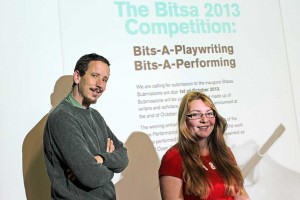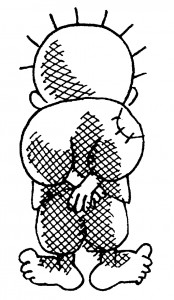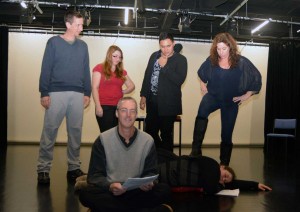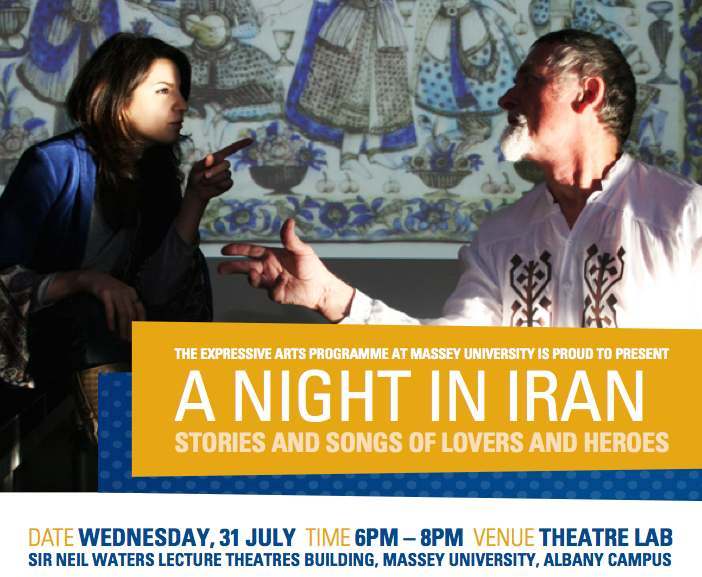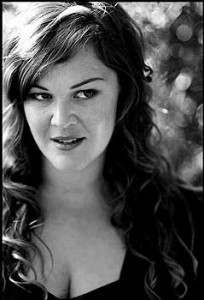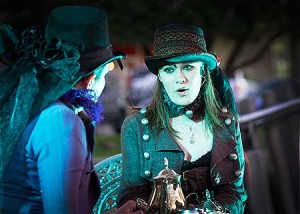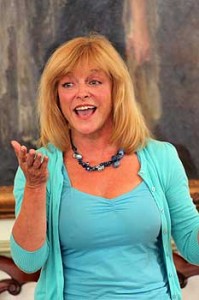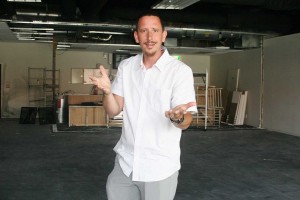
Caption: Dr Rand Hazou, at the Albany campus’ new Theatre Lab to open next month.
New theatre lab a hub for community stories
Growing up in Jordan across the valley from the troubled West Bank has given Palestinian-Kiwi theatre-maker Dr Rand Hazou a unique perspective on the role of theatre in telling marginalised stories. It’s a theme the scholar is keen to explore in the context of ethnically diverse Auckland at the University’s Albany campus. He bucked the migration trend and moved here from Australia to take up the role, bringing a colourful mix of theatrical experiences – from a kid playing the youngest thief in the musical ‘Oliver’ and Shakespearian roles as a teen, to backstage manager in Jordan’s capital Amman for a political satire of Middle East leaders, then researching the role of theatre in advocating for asylum-seekers’ rights in Australia for his PhD.
As the new champion of the Expressive Arts programme in the College of Humanities and Social Sciences, Dr Hazou wants students across academic disciplines to take part in and create cutting-edge theatre. A custom-made Theatre Lab is currently under construction inside the Sir Neil Waters building, to be launched at the end of March. Theatre workshops, performances and artists’ talks are in the pipeline.
“Theatre programmes in universities around the world are constantly battling against shrinking budgets and classes, and here it’s expanding which is really exciting,” he says.
Dr Hazou is especially interested in the role of documentary theatre as a way of connecting with a community, and in the idea of tapping into untold true stories within communities.
“Documentary theatre is about storytelling,” he says. “I’m really interested in finding out what makes this local community tick, producing students who are creative, and engaged with their local community as well.”
His doctoral thesis, which he did at La Trobe University, Melbourne, explored potent examples of how documentary theatre was being used to tell the stories of asylum seekers. Titled Acting for Asylum: Asylum Seeker and Refugee Theatre in Australia 2000-2005, he examined how the traumatic experiences of asylum seekers held in remote detention centres in Australia were told through theatre. The main source of public information about asylum seekers on hunger strikes and rioting was from a government slant via the media, he says. “It was shocking stuff.”
“What was amazing was the theatre response. Actors, directors and ordinary people who were hearing what was going on started contacting groups with access to the detention centres, and going in to befriend these asylum seekers,” he says. “They would write down their stories, and make performances. During this period we had a renaissance of political, documentary theatre in Australia.”
Asylum-seekers’ stories of perilous escape and life in detention centres were turned into scripts and posted on websites so that community theatre groups could download and stage them. During his research he documented 35 new performances about asylum seekers, with some staged numerous times. He also spearheaded the Harakat Project involving Palestinians in Australia – supported by the Australia Council for Arts. Still a work in progress, he hopes to stage it in New Zealand. Again in the documentary theatre mode, it delves into the issue of interrogation, inspired by a New Yorker magazine article. He may straddle two cultures, but for Dr Hazou being Palestinian is at the core of his sensibility towards other marginalised peoples. He grew up in an international community and bi-cultural family, the second of three sons of a Kiwi mum and Palestinian father whose family left Jerusalem in 1947 just before the 1948 Arab-Israeli war.
His father, Tuma Hazou, a radio announcer for the BBC World Service in London, found himself a war correspondent when he bought a camera and returned to Jerusalem to make a documentary about the old city when war broke out in 1967. Mr Hazou met his Kiwi wife Virginia later when he was working for the Hashemite Royal Palace where she was working as a trained nurse and nanny. New Zealand was an exotic faraway place from a Jordan perspective but Dr Hazou’s maternal heritage allowed him to spend a year here as a five-year-old, and again for several months as a high school student during the Gulf War.
As a child, he recalls viewing the West Bank and the lights of Jerusalem from across the Jordan Valley. He didn’t visit the city of his forefathers until he was 21, and has been back several times to Jerusalem and the West Bank, though never to Gaza. As a member of the Palestinian diaspora – estimated at around five million, or half the total population – he believes Palestinian refugees “should be allowed to return and live in peace side by side with Israeli neighbours. Many in refugee camps dream of this.”
But he feels it would be condescending to suggest theatre could heal conflicts as deep as the Arab-Israeli one. “It’s more complicated than this. The idea that people don’t understand each other is false. They just have very deep grievances.
“The theatre that I’m interested in is more about raising questions than solving, or having any therapeutic effect. Provoking people – not just across cultures, also Palestinians, about they how they perceive themselves.”
When it comes to teaching drama at university, he believes theatre skills are highly relevant to a broad range of professions, from business to health, teaching, science and media. “The type of skills you learn in theatre – engaging people, using your voice confidently, physical communication, listening – you can apply in any chosen career. I’m hoping there will be room to cater to people from other disciplines, not just actors.”
Theatre, he says, can also transform and enhance people’s experiences of living in an urban environment. So his drama dreams are likely to spill over into skate parks, beaches and shopping malls, because for Dr Hazou, all the world’s a stage.
